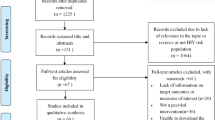Abstract
We describe a survey of 300 young female apprentice tailors in a periurban community in Ibadan, Nigeria. The objectives were to assess HIV risk-related behavior in order to plan appropriate prevention interventions. Most apprentice tailors were 18–21 years old (68%), single (95%), and had not completed secondary school (98%). History of sexual intercourse was reported by 53%; 42% had ever experienced unwanted touching of the breast, backside, shoulder, or waist; 4% reported being raped in the last 6 months. Of sexually active women, 57% reported sexual debut with an instructor; 21% had exchanged sex for money or gifts and only 27% had used a condom during their most recent sexual intercourse. Instability of employment and lack of instructor support were primary barriers to implementing a pilot peer-education HIV prevention project. The poor social and economic conditions of apprentice tailors make them vulnerable to sexual exploitation and, in turn, to HIV infection. A peer-education intervention within the context of a microcredit economic development program may reduce risk for HIV among women in Nigeria's informal economy.
Similar content being viewed by others
REFERENCES
Adekunle, A. O., and Ladipo, O. A. (1992). Reproductive tract infections in Nigeria: Challenges for a fragile health infrastructure. In K. Germain, P. Piot, and J. Wasserheit (Eds.), Reproductive tract infections: Global impact and priorities for women's reproductive health (pp. 297-315). NewYork: Plenum Press.
Ajuwon, A. J., and Shokunbi, W. (1997). Women and the risk of HIV infection in Nigeria. International Quarterly of Community Health Education, 10, 107–120.
Ajuwon, A. J., Oladepo, O., Adeniyi, J. D., and Brieger, W. R. (1994). Sexual practices that may favor the transmission of HIV in a rural Yoruba community in Nigeria. International Quarterly of Community Health Education, 14, 403–416.
Ajuwon, A. J., Osungbade, K. O., Fawole, O., Lurie, P., and Hearst, N. (1998). Knowledge of AIDS and risky sexual practices among female adolescent hawkers in truck and bus stations in Ibadan, Nigeria. Presented at the XII World AIDS Conference, Geneva, June 1998 [Abstract 23439].
Ajuwon, A. J., Akin-Jimoh, I., Olley, B. O., and Akintola,O. (2001). Perceptions of sexual coercion: Learning from young persons in Ibadan, Nigeria. Reproductive Health Matters, 9, 128–136.
Amin, R., Ahmed, A. U., and Chowdhury, J. (1994). Poor women's participation in income-generating projects and their fertility regulation in rural Bangladesh: Evidence from a recent survey. World Development, 22, 555–565.
Araoye, M. O., and Adegoke, A. (1996). AIDS-related knowledge, attitude and behavior among selected adolescents in Nigeria. Journal of Adolescence, 19, 179–181.
Association for Reproductive and Family Health. (1998). The West African Youth Initiative: Promoting change in adolescent health through peer education. Ibadan, Nigeria: Author.
Day, S. (1988). Prostitute women and AIDS: Anthropology. AIDS, 2, 421–428.
Ekweozor, C. C., Olaleye, O. D., Tomori,O., Saliu, I., Essien, E. M., Bakare, R. A., Oni, A. A., Oyewo, O. O., Okesola, A. O., and Onyemenem, T. N. (1995). Clinico-epidemiological patterns of HIV infection in STD patients in Ibadan. African Journal of Medicine and Medical Sciences, 24, 321–327.
Fawole, O. I. (1996). The effectiveness of a school based AIDS/HIV education program on the knowledge, attitude and sexual behavior of students in Ibadan North Local Government Area. Dissertation, Faculty of Public Health, West African College of Physicians, Lagos, Nigeria.
Makinwa-Adebusoye, P. (1993). Sexual behavior, reproductive knowledge and contraceptive use among young urban Nigerians. International Family Planning Perspectives, 18, 66–70.
Meagher, K. (1995). Crisis, informalization and the urban informal sector in sub-Sahara Africa. Development and Change, 26, 259–284.
National Council for Science and the Environment. (2001). Available at www.cnie.org. (21 July 2001).
Nichols, D., Ladipo, A. O., Paxman, J. M., and Otolorin, E. O. (1986). Sexual behavior, contraceptive practice and reproductive health among Nigerian adolescents. Studies in Family Planning, 17, 100–106.
Nigerian Federal Ministry of Health. (1997). Report of 1995/96 HIV Sentinel Sero-surveillance in Nigeria. Lagos, Nigeria: Author.
Nigerian Federal Ministry of Health. (2000). Summary of 1999 findings for HIV/syphilis surveillance. Lagos, Nigeria: Author.
Nigerian Federal Ministry of Health and Human Services. (1995). Reproductive health education for primary and secondary students in Nigeria. Lagos, Nigeria: Author.
Okochi, A. C. (1997). Sexual risk behavior and knowledge about AIDS among inmates of Agodi Prison, Ibadan, Nigeria. Dissertation, University of Ibadan, Ibadan, Nigeria.
Oladepo, O., and Brieger, W. R. (1994). AIDS knowledge, attitudes and sexual behavior patterns among university students in Ibadan, Nigeria. African Journal of Medicine and Medical Sciences, 23, 119–125.
Olaseha, I. O., and Alao, A. (1993). Knowledge, attitudes and at risk behaviors of adolescent students towards AIDS prevention and control in Ibadan city, Oyo State, Nigeria. Nigerian School Health Journal, 7, 127–133.
Orubuloye, I. O., Caldwell, P., and Caldwell, J. (1993). The role of high-risk occupation in the spread of AIDS: Truck drivers and itinerant market women in Nigeria. International Family Planning Perspectives, 19, 43–48.
Speizer, I., Heller, G., and Brieger, W. R. (2000). Survey findings from the West African Youth Initiative Project. Final evaluation of peer education intervention. Dissertation, Tulane University School of Public Health and Tropical Medicine, New Orleans, Louisiana.
StataCorp. (2001). Stata statistical software: release 7.0. College Station, TX: Stata Corporation.
Sweat, M. D., and Denison, J. A. (1995). Reducing HIV incidence in developing countries with structural and environmental interventions. AIDS, 9, S251-S257.
Tawil, O., Verster, A., and O'Reilly, K. R. (1995). Enabling approaches for HIV/AIDS prevention: Can we modify the environment and minimize the risk? AIDS, 9, 1299–1306.
UNAIDS. (2001). Available at www.unaids.org (21 July 2001).
United Nations Development Program. (2001). Available at www.undp.org (21 July 2001).
Williams, E., Lamson,N., Efem, S., Weir, S., and Lamptey, P. (1992). Implementation of an AIDS prevention program among prostitutes in the Cross River State of Nigeria. AIDS, 6, 229–230.
Author information
Authors and Affiliations
Corresponding author
Rights and permissions
About this article
Cite this article
Ajuwon, A.J., McFarland, W., Hudes, E.S. et al. HIV Risk-Related Behavior, Sexual Coercion, and Implications for Prevention Strategies Among Female Apprentice Tailors, Ibadan, Nigeria. AIDS Behav 6, 229–235 (2002). https://doi.org/10.1023/A:1019839824312
Issue Date:
DOI: https://doi.org/10.1023/A:1019839824312




